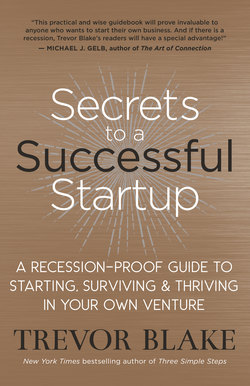Читать книгу Secrets to a Successful Startup - Trevor Blake - Страница 12
На сайте Литреса книга снята с продажи.
ОглавлениеAre you tempted to withdraw your savings, staple a resignation note to your boss’s forehead, and walk away from the corporate world forever? Does the thought of never having to sit through another one of those dumb company meetings — you know the ones, where everything that can be said has been said, but not everyone around the table has said it yet — make you tizzy with excitement?
Or perhaps, have you been postponing your dream of starting your own business — maybe for decades as you focused on other priorities, like raising a family — and find that you don’t want to postpone it any longer? Maybe the kids have flown the nest, you are at a loose end, and you desire to fulfill the potential you’ve always known you have.
If so, you are not alone. Every month in America, more than half a million people start a company, the majority being unregistered single-person ventures, with 69 percent of all startups beginning at home. In 2018, however, 670,000 new companies were registered in the United States alone. Women are majority owners of 40 percent of all the registered companies, but it is difficult to know the percentage of startups (various studies conclude between 25 and 45 percent). Further, according to a 2014 University of Phoenix Business School survey, some 39 percent of employees hope to own their own business. Contrary to what many in the media would have us believe, the statistics clearly show that the pioneer spirit in America is alive and well. These are happy statistics that fill us with hope for the American dream.
Or maybe running one’s own business is a universal dream. According to research, more than 50 million new businesses are started globally every year. Of course, numbers per country vary widely and getting an accurate number is a bit of a lottery. Iceland was home to about 8,000 new businesses and India to about 85 million startups. Tel Aviv’s startup ecosystem is one of the most highly developed in the world. Israel has more startups per capita than any other country, and its startups collectively raised $6.47 billion in 2018.
In 2017, the United Kingdom reached over 600,000 startups for the first time. London ranked as Europe’s “most successful startup ecosystem,” yet its output is half that of Silicon Valley. Meanwhile, startups in São Paulo, Brazil, create more local community jobs than Silicon Valley. Startups really are a global phenomenon, one fueled by modern communications technology, which allows anyone to start a company anywhere.
The one depressing statistic is that as many startups fail as start every year. Why? Lots of reasons. But mainly because entrepreneurs don’t conceive of their startup in the right way or approach it with the correct mentality to begin with. Part 1 shows you how to avoid joining this negative statistic.
First, I explore where winning concepts come from and how to cultivate them. Then I look at how to turn that insight into a winning plan for a successful business.
